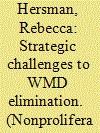| Srl | Item |
| 1 |
ID:
150287


|
|
|
|
|
| Summary/Abstract |
President Barack Obama came into office determined to bring new energy to nuclear and biological threat reduction and nonproliferation efforts. In rapid succession, his 2009 Prague speech, the nuclear security summit process he started in 2010, and the 2009 National Strategy for Countering Biological Threats sparked hope for reducing threats from weapons of mass destruction (WMD). Yet, chemical weapons, the junior member of the WMD triumvirate, scored nary a mention in the administration’s early days, except as chemical weapons demilitarization lagged behind U.S. commitments under the Chemical Weapons Convention (CWC).
|
|
|
|
|
|
|
|
|
|
|
|
|
|
|
|
| 2 |
ID:
158018


|
|
|
|
|
| Summary/Abstract |
2018 marks the seventh year of a civil war in Syria which, from its very beginning, has been marred by the use of chemical weapons (CW). The Syrian regime – responsible for the vast majority of an estimated 150 attacks or more – has faced little or no penalty for its crimes. The attacks are blatant violations of the Chemical Weapons Convention (CWC), multiple United Nations resolutions and a host of international laws and protocols.
|
|
|
|
|
|
|
|
|
|
|
|
|
|
|
|
| 3 |
ID:
147675


|
|
|
|
|
| Summary/Abstract |
Operations to eliminate weapons of mass destruction (WMD) are highly situation-dependent and defy easily replicable solutions and approaches. Nevertheless, by examining WMD elimination missions as they have transpired over the past several decades, we can begin to identify several consistent challenges. Learning to better prepare for these challenges—both within and across various facets of the US government as well as with our international partners—will enhance future elimination operations and their chances of success. The article concludes by asserting that military and nonmilitary approaches to these operations are not competing ideological approaches but rather reflect the complexity of the operational environment and the subsequent need for a range of legal, political, military, financial, and diplomatic tools.
|
|
|
|
|
|
|
|
|
|
|
|
|
|
|
|